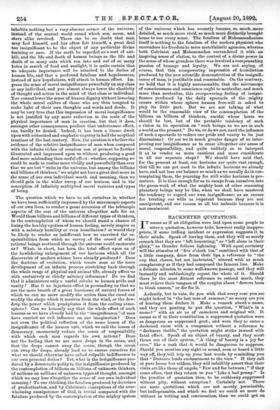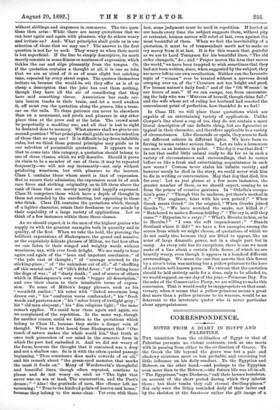HACKNEYED QUOTATIONS.
IT seems as if an obligation were laid upon some people to utter a quotation, however trite, however really inappro- priate, if some triffing incident or expression suggests it to their minds. Speak of leaving them, and they will as surely. remark that they are "left lamenting," or "left alone in their glory," as thunder follows lightning. With equal certainty will the stimulus of "five o'clock tea," combined with that of a little company, draw from their lips a reference to "the cup that cheers, but not inebriates," uttered with as much complacency as if they had composed the famous line. Make a delicate allusion to some well-known passage, and they will instantly and unblushingly repeat the whole of it. Should there be the most distant reference to retired merit, they must relieve their tongues of the couplet about "flowers born to blush unseen," or die for it.
Ardently, but in vain, do you wish that every rose you see- might indeed be "the last rose of summer," so weary are you of hearing them declare it. Make a remark about a name, and they are panting to put the question, "What's in a name P" with an air as of conscious and original wit. It seems as if to their constitution a suppressed quotation were- as dangerous as suppressed gout; and were they to enter a darkened room with a companion without a reference to "darkness visible," the quotation might strike inward with. fatal effect. Speak of an object of beauty, and they must throw out of their system, "A thing of beauty is a joy for ever," like a rash that it would be dangerous to suppress. Should you mention any sight or sound, seen or heard a little way off, they will trip up your last words by reminding you that "Distance lends enchantment to the view." If they call at your house but seldom, they will infallibly assert that their visits are like those of angels, "Few and far between ; " if they come often, that they return to you "Like a bad penny." Is the practice of quotation then, to be ruthlessly suppressed without pity, without exception ? Certainly not. There are some quotations which are not merely permissible, but indispensable, and which we feel we could no more do without in writing and conversation, than we could get on without shillings and sixpences in commerce. The two ques- tions then. arise : While there are many quotations that we can hear again and again with pleasure, why do others weary and irritate us ? And : What principles shall guide us in our selection of those that we may use ? The answer to the first :question is not far to seek. They weary us when their merit is but superficial If the line be simply descriptive, its merit merely consists in some fitness or neatness of expression, which tickles the ear and slips pleasantly from the tongue. Or, if the quotation contains a thought at all, it is one so trite that we are as tired of it as of some slight but catching tune, repeated by every street organ. The quoters themselves irritate us, because the would-be wit they offer us is of so cheap a description that the joke has cost them nothing, though they have all the air of considering that they have said something clever. Aseaciation has made cer- tain beaten tracks in their brain, and let a word awaken it, -off must run the quotation along the groove, like a tram- car on the rails. To them patience can never be elsewhere than on a monument, and youth and pleasure in any other place than at the prow and at the helm. The crowd must be perpetually a madding one, and all that is lost to sight be declared dear to memory. What answer shall we give to our .second question? What principles shall guide us in the selection of those that we may use? It is difficult to lay down infallible rules, but we think these general principles may guide us in our selection of permissible quotations It appears to us that to come into this category, a quotation should belong to one of three classes, which we will describe. Should it prove its claim to be a member of one of them, it may be repeated frequently—we will not say incessantly—not only without producing weariness, but with pleasure to the hearers. Class I. contains those whose merit is that of expression. But to secure their admission, the expression must be of such rare force and striking originality, as to lift them above the rank of those that are merely neatly and. happily expressed. Class II. comprises those which have a depth of thought in them not sounded by the unreflecting, but appealing to those who think. Class IlL contains the quotations which, though of a lighter character, retain their freshness to our minds by their capability of a large variety of applications. Let us think of a few instances within those three classes.
As we should expect, it is the men of the highest genius who supply us with the greatest examples both in quantity and in -quality, of the first. When we take the bold, the piercing, the brilliant expressions of Shakespeare, the grand and massive, or the exquisitely delicate phrases of Milton, we feel how often we can listen to their winged and weighty words without -weariness, nay, with ever fresh delight. We are ready to hear again and again of the "lame and impotent conclusion ; " of "the pale cast of thought ; " of "courage screwed to the sticking-place ; " of "the unkindest cut of all ; " of "shuffling o ff this mortal coil ; " of "life's fitful fever ; " of "letting loose • the dogs of war ; " of "dusty death ; " and of scores of others which in Shakespeare's own words "beggar all description," and owe their charm to their inimitable turns of expres- sion. To some of Milton's happy phrases, such as his ' wreathed smiles ; " his notes with "linked sweetness long drawn out ; " his "confusion worse confounded ; " his "fresh woods and pastures new ; " his" sober livery of twilight grey;" his "old man eloquent ; " his "dim religious light ; " the same remark applies. We could hear them again and again, ere we complained of the repetition. In the same way, though for another reason, could we listen to the quotations which belong to Class II., because they strike a deeper vein of thought. When we first heard from Shakspeare that "One touch of nature makes the whole world kin," that truth at once took possession of our mind in the concrete form in which the poet had embodied it. And we did not weary of the form, because the thought that it contained was a deep and not a shallow one. So is it with the often-quoted passage beginning, "Thus conscience does make cowards of us all," and his remark about "the green-eyed monster, that mocks the meat it feeds on." Many of Wordsworth's thoughtful and beautiful lines, though often repeated, continue to please and do not weary us, such as "The light that never was on sea or land, The consecration, and the Poet's dream ; " " Alas ! the gratitude of men, Has oftener left me monrnhag ; "True Trae to the kindred points of heaven and home," • because they belong to the same class. Yet even with these
last, some judgment must be used in repetition. If hurled at our heads every time the subject suggests them, without pity or restraint, human nature will rebel at last, even against the most beautiful of them. When we feel the inevitability of a quotation, it must be of transcendent merit not to make us cry mercy from it at last. It is for this reason that, grateful as we are to Lord Tennyson for his beautiful lines, "The old order ohangeth," &c.; and "Prayer moves the Arm that moves the world," we have been tempted to wish sometimes that they had not been written, since, when suggested by the subject, they are never left to our own recollection. Neither can the favourite topic of " woman " ever be treated without a nervous dread creeping over us, of the "Creature not too bright and good, For human nature's daily food ;" and of the "Oh Woman ! in our hours of ease." If we can escape, too, from encounter- ing the lady who was "Mistress of herself, though china fall ;" and the wife whose art of ruling her husband had reached the concealment point of perfection, how thankful do we feel!
In Class III. we will place those quotations which are capable of an entertaining variety of application. Unlike Cowper's line about a cup of tea, they do not contain a mere literal description of one definite thing, but are figurative or typical in their character, and therefore applicable to a variety of circumstances. Like diamonds or opals, they seem to flash out different colours in different lights. We have been re- ferring to some rather serious lines. Let us take a humorous one now, as an instance in point. "The dog it was that died ! " Is not that useful little animal ready to die for us in such a variety of circumstances and surroundings, that he comes before us like a fresh and entertaining acquaintance in each new scene ? Custom never stales his infinite variety ; and however surely he died in the story, we could never wish him to die in writing or conversation. May that dog that died, live for ever ! Let us just glance at a few more instances, the greater number of them, as we should expect, coming to us from the prince of creative geniuses. In " Othello's occupa- tion's gone ;" "Though this be madness, yet there's method in it;" "The engineer, hoist with his own petard ;" "When Greek meets Greek" (in the original, "When Greeks joined Greeks ") ; "We have scotched the snake, not killed it ;" "Butchered to make a Roman holiday ;" "The cry is, still they come !" "Hyperion to a satyr;" "What's Hecuba to him, or he to Hecuba P" "I own the soft impeachment ; " "Stands Scotland where it did ? " we have a few examples among the scores from which we might choose, of quotations of which we do not easily tire, because they are fitted to appear, like an actor of large dramatic power, not in a single part but in many. As every rule has its exceptions, there is one we must make of a line about a certain little flower, of which we are heartily weary, even though it appears in a hundred different surroundings. We mean the one that asserts that this flower by a river's brim was nothing but a yellow primrose to the hero of a certain well-known poem. We entreat that the quotation should be laid entirely aside for a time, only to be alluded to, we would suggest, on one day of the year,—Primrose Day. For the sake of the Conservative Party, we are willing to make this concession. That it would really be inappropriate on that anni- versary, when it seems that a yellow primrose means a great deal more than a yellow primrose to its wearers, would be no deterrent to the inveterate quoter who is never particular about appropriateness.



































 Previous page
Previous page